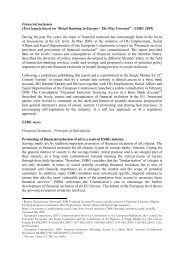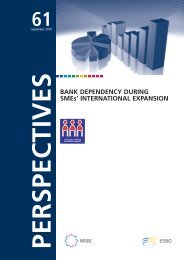A comparative analysis of the US and EU retail banking markets - Wsbi
A comparative analysis of the US and EU retail banking markets - Wsbi
A comparative analysis of the US and EU retail banking markets - Wsbi
You also want an ePaper? Increase the reach of your titles
YUMPU automatically turns print PDFs into web optimized ePapers that Google loves.
Factoring is also continuously gaining importance<br />
in Europe. About 11% <strong>of</strong> SMEs in Europe use<br />
factoring, but considerable differences can be<br />
observed between countries.<br />
6.2.3.2.2 Lenders to SMEs in <strong>the</strong> <strong>EU</strong><br />
In many parts <strong>of</strong> Europe, regional banks have played<br />
a fundamental role in <strong>the</strong> growth <strong>of</strong> local economies.<br />
The centralised structure <strong>of</strong> commercial banks makes<br />
<strong>the</strong> cost <strong>of</strong> assessing <strong>and</strong> monitoring loans to small<br />
firms too high in relation to <strong>the</strong> returns, thus leading<br />
banks to ration credit to this category <strong>of</strong> potential<br />
customers 354 .<br />
In many Member States, such regional banks as <strong>the</strong><br />
savings banks are <strong>the</strong> key providers <strong>of</strong> <strong>banking</strong> loans<br />
to small businesses.<br />
Though no publicly available data exists to reveal <strong>the</strong><br />
differences in <strong>the</strong> proportion <strong>of</strong> bank lending which<br />
is <strong>of</strong>fered to SMEs between commercial <strong>and</strong> noncommercial<br />
banks in Europe, both savings banks <strong>and</strong><br />
cooperative banks have a longst<strong>and</strong>ing tradition in<br />
serving <strong>the</strong> needs <strong>of</strong> such firms as SMEs have always<br />
been considered an important customer segment by<br />
<strong>the</strong>se types <strong>of</strong> banks.<br />
Savings banks in Europe provide not only loans to<br />
SMEs, but also a number <strong>of</strong> services, such as support<br />
to new enterprises by placing in-house start-up advisors<br />
at <strong>the</strong>ir side, or via <strong>the</strong> provision <strong>of</strong> technical assistance.<br />
Savings banks in Spain, France <strong>and</strong> Germany have<br />
even gone as far as to set up special SME bank<br />
branches to provide a quality comprehensive service<br />
tailored to SMEs’ specific needs. They also operate<br />
special centres that assist <strong>and</strong> inform SMEs about<br />
<strong>markets</strong>, new business or tax-related promotions, <strong>and</strong><br />
run special programmes to promote <strong>the</strong> creation <strong>of</strong><br />
innovative local companies. Joint projects have also<br />
been established to take advantage <strong>of</strong> technological<br />
developments, leading to outcomes such as computer<br />
programmes adapted to SME needs.<br />
In Germany for example, 75% <strong>of</strong> SMEs have a <strong>banking</strong><br />
relationship with a savings bank or a L<strong>and</strong>esbank,<br />
<strong>and</strong> for almost 60% <strong>of</strong> <strong>the</strong> enterprises savings banks<br />
are <strong>the</strong>ir main <strong>banking</strong> partner or "Hausbank".<br />
According to estimates, savings banks in Germany<br />
account for nearly 43% <strong>of</strong> loans to SMEs (2005) <strong>and</strong><br />
this market share is as high as 70% for small<br />
businesses with a turnover below €500,000.<br />
In addition, in <strong>the</strong> last few years more than half <strong>of</strong> all<br />
business start-ups in Germany were financed by <strong>the</strong><br />
institutions <strong>of</strong> <strong>the</strong> Sparkassen-Finanzgruppe. The group<br />
provides support through its 90 private equity<br />
companies, <strong>and</strong> also through regional development<br />
<strong>and</strong> private equity/venture-capital companies as well<br />
as via events which it sponsors such as “Going Public”<br />
or <strong>the</strong> “StartUp” competition.<br />
Taking ano<strong>the</strong>r example, <strong>the</strong> Austrian savings banks<br />
facilitate a number <strong>of</strong> credit actions for SMEs. In<br />
particular, <strong>the</strong> focus is on <strong>the</strong> initial launch stage <strong>of</strong><br />
companies. One scheme put in place by Austrian<br />
savings banks which has existed for a number <strong>of</strong><br />
years is <strong>the</strong> ‘Go! Gründer<strong>of</strong>fensive’ 355 which provides<br />
assistance for <strong>the</strong> creation <strong>of</strong> companies <strong>and</strong> extends<br />
support to newly created firms. Regular workshops<br />
are also organised in all <strong>the</strong> Austrian regions in order<br />
to provide training to entrepreneurs.<br />
In Sweden, Swedbank, <strong>the</strong> European Savings Banks<br />
Group’s Swedish member, is <strong>the</strong> country’s largest<br />
business bank <strong>and</strong> works with a third <strong>of</strong> <strong>the</strong><br />
country’s small <strong>and</strong> medium size companies.<br />
6.2.3.2.3 The challenges to small businesses<br />
seeking financing in <strong>the</strong> <strong>EU</strong><br />
The future <strong>of</strong> funding to SMEs in <strong>the</strong> <strong>EU</strong> is an<br />
ongoing concern. The European Commission has<br />
itself looked into ways <strong>of</strong> improving access to<br />
finance for European SMEs 356 , recognising <strong>the</strong><br />
importance <strong>of</strong> bank financing for SMEs, <strong>and</strong><br />
expressing fear that changes in <strong>the</strong> bank sector, such<br />
as bank mergers <strong>and</strong> <strong>the</strong> closure <strong>of</strong> bank branches,<br />
may affect SME funding 357 .<br />
354 The importance <strong>of</strong> regional banks in funding small firms in Europe was recognised in a study funded by <strong>the</strong> UK’s Economic <strong>and</strong> Social Research Council,<br />
entitled: “Europe's Advantage: Banks <strong>and</strong> Small Firms in Europe <strong>and</strong> Britain”, by Dr. Francesca Carnevali, September 2005.<br />
355 See http://www.go-gruendercenter.net.<br />
356 See http://europa.eu.int/comm/enterprise/entrepreneurship/financing/publications_documents.htm.<br />
357 See page 9 <strong>of</strong> “Microcredit for small businesses <strong>and</strong> business creation: bridging a market gap”, Enterprise publications, European Commission, November 2003,<br />
where it is said that “The <strong>banking</strong> sector is undergoing major adjustments due to <strong>the</strong> merger dynamics, <strong>the</strong> search for pr<strong>of</strong>itability <strong>and</strong> <strong>the</strong> economic<br />
downturn, which might have an impact on <strong>the</strong>ir relationship with small entrepreneurs. The closure <strong>of</strong> local branches by many banks across Europe might also<br />
have an impact on banks’ ability to get accurate information about local small businesses”.<br />
126
















